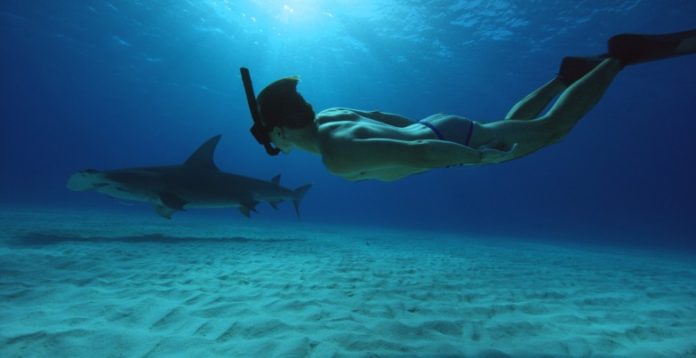On 5th June, Cine-ONU Brussels, Vienna and Geneva came together to host their second online event to mark World Environment Day 2020. In collaboration with the United Nations Environment Programme (UNEP) and the Geneva Environment Network, audiences at home were invited to watch ‘Sharkwater Extinction’, an award-winning documentary directed, written and produced by Rob Stewart. Thousands watched the film and hundreds registered for the panel discussion on the themes of biodiversity and nature.
‘Sharkwater Extinction’ is the latest film in the Sharkwater series and follows Rob Stewart through West Africa, Spain, Panama, Costa Rica and France in his efforts to expose the political corruption behind the billion dollar illegal shark fin industry. At the same time, Rob Stewart’s film attempts to debunk the popularised belief that sharks are human-eating monsters. Instead, ‘Sharkwater Extinction’ explores the balancing role played by sharks in the oceans’ ecosystems and advocates for the peaceful cohabitation of humans and sharks.
The film was followed by a panel discussion on the main drivers in oceanic biodiversity loss and what can be done to halt accelerating species loss and the degradation of our natural world. Rob Stewart’s parents and the film’s producers, Sandy Campbell and Brian Stewart, were joined by wildlife experts from across the world including Jessica Battle, Senior Global Ocean Governance and Policy Expert at WWF, Susan Gardner, Director of the Ecosystems Division at UNEP and Tom De Meulenaer, Chief of the Secretariat’s Scientific Services Team at CITES. Over 150 people from across the world joined the discussion.
The panelists began by addressing the issue of the shark as a symbol of fear and highlighted the problems this can present to conservation efforts. Sandy Campbell, Rob’s mother, said that this issue was a key motivation for Rob in making the film, “You can’t protect something if you don’t see the beauty and that’s what Rob tried to do”.
Jessica Battle acknowledged the iconic nature of sharks as “a powerful symbol of conservation, nature and the ocean” but also noted the negative impact of the JAWS legacy and other popularised depictions of sharks on human attitudes. “There is this JAWS fear that a lot of people still harbour and films like this show another side of sharks, I really appreciated that.”
All panelists agreed that the situation for sharks has reached a critical point. Tom De Meulenaer explained that 200 million sharks are killed per year and Brian Stewart also pointed out that many of the sharks that were shown being sold in the film could also be found on the endangered list.
The shark fin industry has a detrimental impact on biodiversity. As Sandy Campbell explained “sharks are a key species because they manage the populations of fish below them”. However, the discussion also highlighted the impact of overfishing on local communities.
“The overfishing of sharks allows fish to travel further out to sea where fishing boats can’t go, they can’t afford the gas. This results in a lack of income and a lack of protein source – it’s more than just the sharks” said Sandy Campbell. Brian Stewart also acknowledged the corruption and inequality that both fuels, and is fuelled by, the shark fishing industry. “We need to cut out the middle man who is making billions of dollars when the fisherman might only make five dollars a fin … that would make a huge difference.”
Susan Gardner agreed that local communities should be at the centre of considerations when developing solutions to combat overfishing. “We need solutions that benefit nature but support local communities and benefit them in the long term.”
When it came to discussing the ways in which biodiversity loss could be halted, the panelists agreed that increasing awareness was key.
Sandy Campbell explained the problem of mislabelled shark products and the need for educated consumers. “There are so many mislabelling issues taking place … in Central and South America baby hammerhead sharks are masked as scallops … You can even find shark in cosmetics under the name squalene, manufactured using a shark’s liver because it is very rich in oil … this is the kind of problem we are dealing with and this is why you have to educate the consumer, they have to question it.”
Tom De Meulenaer highlighted the important work of CITES in educating countries about the problems of overfishing and illegal trade. “Our role is to educate and work with customs officers, scientists, and government agencies … to empower countries to confiscate things that are not acceptable”. In Hong Kong last year, CITES was part of the confiscation of shark fins worth 1.1 million dollars.
Susan Gardner also underlined the important role that can be played by young people as informed communicators. She referred to UNEP’s Earth School which aims to educate children on the natural world around them. “These kind of programmes are essential because the future we want depends on what we are teaching” said Susan Gardner. Brian Stewart agreed that new generations of storytellers and filmmakers were essential to raising awareness for ocean conservation.
When asked how likely it is that sharks can recover the panelists were optimistic. By increasing consumer awareness, better regulating trade, protecting habitats and reducing poverty it was generally agreed that shark populations could recover. “We have to stay optimistic. If we take the pressure off nature it will rebound, even slow growing and slow reproducing animals like sharks” said Susan Gardner. Sandy Campbell and Brian Stewart spoke of recovering shark populations in Indonesia and used the example of Canada as an example of where there has been increased regulation. “Last year Canada banned the trade of shark fins despite previously being the largest importer of shark fins outside of Asia” said Brian Stewart.
Additional links:
- UN Cinema | Ciné-ONU
- Sharkwater Extinction (website)
- Ciné-ONU crosses borders with its first online event
- UNRIC COVID-19 backgrounder

